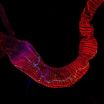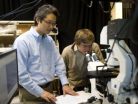Trust your gut ... but only sometimes
2011-01-06
(Press-News.org) When faced with decisions, we often follow our intuition—our self-described "gut feelings"—without understanding why. Our ability to make hunch decisions varies considerably: Intuition can either be a useful ally or it can lead to costly and dangerous mistakes. A new study published in Psychological Science, a journal of the Association for Psychological Science, finds that the trustworthiness of our intuition is really influenced by what is happening physically in our bodies.
"We often talk about intuition coming from the body—following our gut instincts and trusting our hearts", says Barnaby D. Dunn, of the Medical Research Council Cognition and Brain Sciences Unit in Cambridge, U.K., first author of the new paper. What isn't certain is whether we should follow, or be suspicious of, what our bodies are telling us. And do we differ in the influence that our gut feelings have on how we make decisions?
To investigate how different bodily reactions can influence decision making, Dunn and his co-authors asked study participants to try to learn how to win at a card game they had never played before. The game was designed so that there was no obvious strategy to follow and instead players had to follow their hunches. While playing the game, each participant wore a heart rate monitor and a sensor that measured the amount of sweat on their fingertips.
Most players gradually found a way to win at the card game and they reported having relied on intuition rather than reason. Subtle changes in the players' heart rates and sweat responses affected how quickly they learned to make the best choices during the game.
Interestingly, the quality of the advice that people's bodies gave them varied. Some people's gut feelings were spot on, meaning they mastered the card game quickly. Other people's bodies told them exactly the wrong moves to make, so they learned slowly or never found a way to win.
Dunn and his co-authors found this link between gut feelings and intuitive decision making to be stronger in people who were more aware of their own heartbeat. So for some individuals being able to 'listen to their heart' helped them make wise choices, whereas for others it led to costly mistakes.
"What happens in our bodies really does appear to influence what goes in our minds. We should be careful about following these gut instincts, however, as sometimes they help and sometimes they hinder our decision making," says Dunn.
###
For more information about this study, please contact Barnaby Dunn at Barney.Dunn@mrc-cbu.cam.ac.uk.
The APS journal Psychological Science is the highest ranked empirical journal in psychology. For a copy of the article "Listening to Your Heart: How Interoception Shapes Emotion Experience and Intuitive Decision Making" and access to other Psychological Science research findings, please contact Keri Chiodo at 202-293-9300 or kchiodo@psychologicalscience.org.
END
ELSE PRESS RELEASES FROM THIS DATE:
2011-01-06
New Rochelle, NY, January 4, 2011—Lowering the body temperature of patients soon after they have suffered a severe brain injury may reduce neurologic complications and improve outcomes. The safety of therapeutic hypothermia for traumatic brain injury (TBI) has been demonstrated in national studies. According to a Roundtable Discussion of renowned experts in the field, when and how it is administered should depend on the clinical condition of individual patients. The Roundtable was published online ahead of print in the new peer-reviewed journal Therapeutic Hypothermia and ...
2011-01-06
Clues about how the human gut helps regulate our appetite have come from a most unusual source – fruit fly faeces. Scientists at the University of Cambridge are using the fruit fly to help understand aspects of human metabolism, including why pregnant women suffer from bloating and constipation, and even the link between a low calorie diet and longevity.
Although scientists have known for some time that there are as many as 500 million nerve cells in our gut, the sheer complexity that this presents means that little is known about the different types of nerve cell and ...
2011-01-06
CAMBRIDGE, Mass. -- About one-third of the human population is infected with a parasite called Toxoplasma gondii, but most of them don't know it. Though Toxoplasma causes no symptoms in most people, it can be harmful to individuals with suppressed immune systems, and to fetuses whose mothers become infected during pregnancy. Toxoplasma spores are found in dirt and easily infect farm animals such as cows, sheep, pigs and chickens. Humans can be infected by eating undercooked meat or unwashed vegetables.
Jeroen Saeij, an assistant professor of biology at MIT is investigating ...
2011-01-06
Patients with early rheumatoid arthritis (RA) who are current smokers were less likely to achieve good response to methotrexate (MTX) and tumor necrosis factor (TNF) inhibitors than those who never smoked. The study by researchers from Sweden also found that RA patients who smoked in the past did not experience a lower response to these therapies. Results of the 10-year study appear in the January 2011 issue of Arthritis & Rheumatism, a journal published by Wiley-Blackwell on behalf of the American College of Rheumatology (ACR).
According to the World Health Organization ...
2011-01-06
The presence of antinuclear antibodies (ANA) indicates the possibility of autoimmunity and the indirect immunofluorescence (IIF) assay on HEp-2 cells is the standard blood test (ANA-HEp-2) used to detect ANA. However, studies have shown that a "false-positive" ANA test occurs in up to 13% of healthy individuals. In such cases the test detects the presence of autoantibodies that apparently are not associated with autoimmunity. Researchers from Brazil have now uncovered distinguishing characteristics of the ANA test in healthy individuals and patients with autoimmune disease, ...
2011-01-06
During a total eclipse of the Sun, skywatchers are awed by the shimmering corona -- a faint glow that surrounds the Sun like gossamer flower petals. This outer layer of the Sun's atmosphere is, paradoxically, hotter than the Sun's surface, but so tenuous that its light is overwhelmed by the much brighter solar disk. The corona becomes visible only when the Sun is blocked, which happens for just a few minutes during an eclipse.
Now, an instrument on board NASA's Solar Dynamics Observatory (SDO), developed by Smithsonian scientists, is giving unprecedented views of the ...
2011-01-06
New research found clinicians who care for patients with osteoarthritis (OA) are likely not following standard care guidelines that are based on current medical evidence. Researchers noted physicians were prescribing medications for pain and inflammation, or opting for surgical interventions rather than recommending weight loss plans or exercise programs to OA patients. Details of the this study are available in the January 2011 issue of Arthritis Care & Research, a journal published by Wiley-Blackwell on behalf of the American College of Rheumatology.
A 2002 report ...
2011-01-06
WEST LAFAYETTE, Ind. - Researchers are creating a new type of solar cell designed to self-repair like natural photosynthetic systems in plants by using carbon nanotubes and DNA, an approach aimed at increasing service life and reducing cost.
"We've created artificial photosystems using optical nanomaterials to harvest solar energy that is converted to electrical power," said Jong Hyun Choi, an assistant professor of mechanical engineering at Purdue University.
The design exploits the unusual electrical properties of structures called single-wall carbon nanotubes, using ...
2011-01-06
More plant matter could be burned in coal-fired power stations if this 'green' fuel was delivered pre-roasted like coffee beans, according to researchers from the University of Leeds, UK.
Many UK power stations are now burning plant matter, or biomass, as well as coal in a bid to cut their carbon footprint. Unlike fossil fuels, plants like willow, Miscanthus and poplar are a virtually carbon-neutral source of energy: the carbon dioxide emitted when they burn is absorbed during photosynthesis by the next batch of 'energy crops' planted in their place.
But the environmental ...
2011-01-06
WEST LAFAYETTE, Ind. - The United States doesn't have the infrastructure to meet the federal mandate for renewable fuel use with ethanol but could meet the standard with significant increases in cellulosic and next-generation biofuels, according to a Purdue University study.
Wally Tyner, the James and Lois Ackerman Professor of Agricultural Economics, and co-authors Frank Dooley, a Purdue professor of agricultural economics, and Daniela Viteri, a former Purdue graduate student, used U.S. Department of Energy and Environmental Protection Agency data to determine that the ...
LAST 30 PRESS RELEASES:
[Press-News.org] Trust your gut ... but only sometimes




